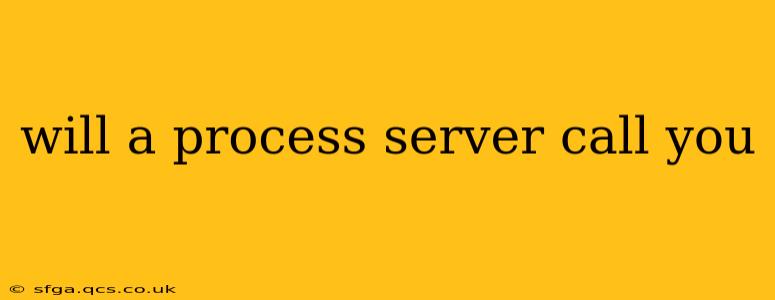Will a Process Server Call You Before Serving You Papers?
The short answer is: usually not. Process servers are generally not required to call before serving legal documents. Their job is to ensure proper service according to the rules of the jurisdiction, and a phone call isn't typically part of that process. However, there are exceptions and nuances to consider.
While a phone call isn't standard practice, some process servers might choose to do so for various reasons. Understanding these reasons and the overall process is crucial. Let's delve into some frequently asked questions:
Why wouldn't a process server call?
- Legal Requirements: The primary reason is that there's often no legal requirement to call beforehand. The rules governing service of process prioritize ensuring the documents are delivered correctly and that proof of service is obtained. A phone call adds an unnecessary step and potential for complications.
- Avoiding Interference: A phone call might tip off the recipient, potentially leading to them avoiding service or attempting to obstruct the process. This could delay or complicate legal proceedings.
- Efficiency: Process servers often have busy schedules and many cases to handle. Making phone calls for every service adds significant time and reduces their efficiency.
Are there situations where a process server might call?
- Difficult Service: If the process server anticipates difficulty in locating the recipient, they might attempt a preliminary phone call to schedule a convenient time for service. This is more likely in cases involving individuals who are frequently on the move or difficult to track down.
- Courtesy or Professionalism: Some process servers might choose to make a courtesy call as a professional courtesy, especially if they have a pre-existing relationship with the recipient or anticipate a particularly sensitive situation. However, this is not the norm.
- Specific Instructions: A court or an attorney might specifically instruct the process server to make contact before attempting service, especially in situations requiring extra sensitivity or where cooperation is sought.
What should you do if you receive a call from someone claiming to be a process server?
Proceed with caution. Legitimate process servers rarely call ahead. Do not admit to anything or provide any information without verifying their identity. Ask for their name, company, case number, and the court involved. Then, independently verify this information through the relevant court or attorney.
What if you're avoiding service?
Attempting to avoid service of process is never a good idea. Ignoring legal documents will only worsen the situation and likely lead to harsher consequences. It's always best to address legal matters promptly and seek legal counsel if you've received or anticipate receiving legal documents.
Can a process server leave documents with someone else?
Depending on the jurisdiction and the specific circumstances, process servers may be able to leave documents with another person at your residence or place of business. This often depends on the age and relationship of the person accepting the documents. The rules regarding substituted service vary significantly by state and even county.
In conclusion, while it's possible a process server might call, it's not typical. The focus is on proper and timely service, not preliminary phone calls. If you receive a call from someone claiming to be a process server, take the necessary steps to verify their identity and the legitimacy of the claim. Always seek legal advice if you have questions or concerns about legal papers.
